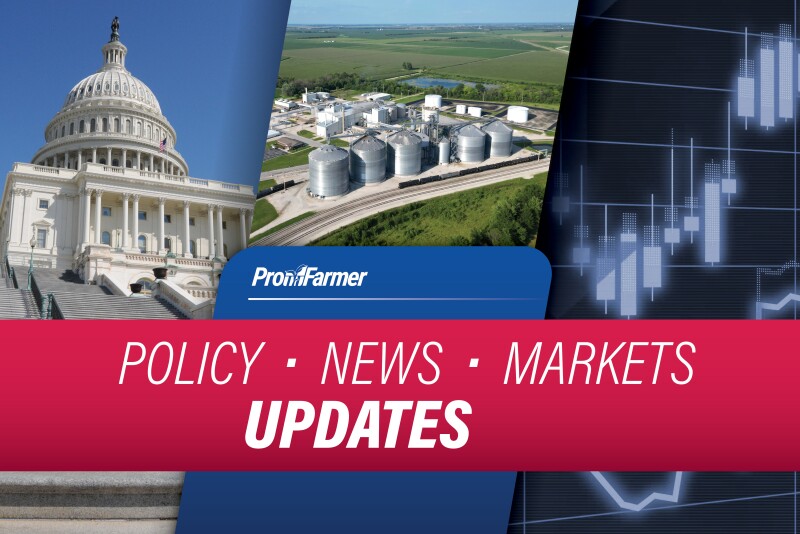Trade pacts take shape, but U.S. farmers still in the dark (Agri-Pulse): The Trump administration is rolling out a string of trade agreements, saying they’ll help clear obstacles for U.S. farm exports. Countries from the UK to Vietnam are rushing to strike deals ahead of a Friday deadline, when President Trump plans to impose sweeping, country-specific tariffs on most U.S. imports. But so far, details on what these agreements actually mean for agriculture are thin — and in some cases, disputed.
The White House says it’s reached arrangements with the United Kingdom, Vietnam, Indonesia, Japan, the Philippines, and the European Union, with more possibly on the way. Some countries, like India, have made one-off concessions on certain products in hopes of improving trade relations. These talks have been underway since April, when Trump first floated his tariff plan, and have centered on cutting tariffs in exchange for various concessions.
Still, the uncertainty has farmers on edge. Vincent Smith, who leads agricultural policy studies at the American Enterprise Institute, reported to Agri-Pulse the stakes are high for corn, wheat, soybeans, pork, and other U.S. exports that could face retaliatory tariffs. “With market access on the line, we can’t afford to have an unreliable trade negotiator steering these talks,” Smith said. “Countermeasures that close off our markets remain a big worry. It’s really quite troubling.”
South Korea trade agreement: President Donald Trump on Wednesday announced a preliminary trade agreement with South Korea, securing another deal from a top trading partner just days before his Aug. 1 tariff deadline.
Trump said in a social media post that he will impose a 15 percent duty on South Korean imports — down from the 25 percent he had threatened.
In exchange, South Korea’s government pledged to invest $350 billion in assets owned and controlled by the United States, and selected by Trump, the president said.
“It is also agreed that South Korea will be completely OPEN TO TRADE with the United States, and that they will accept American product including Cars and Trucks, Agriculture, etc,” Trump wrote. “I would like to thank the Trade Representatives who came forward today. It was an Honor to meet them, and talk about the Great Success of their Country!”
Senate Democrats ready Brazil tariff challenge: Senate Democrats are already eyeing another opportunity to force a vote on President Donald Trump’s tariff agenda after he issued a new emergency declaration to increase tariffs on Brazilian goods starting Friday.
Trump had threatened to boost the tariff rate on Brazilian exports to 50%, up from 10% imposed under his so-called reciprocal tariffs, in part, over the country’s prosecution of its former president and Trump’s political ally, Jair Bolsonaro. On Wednesday, the president signed an order establishing new 40% duties, bringing the total tariff hikes since April 2 to 50%, arguing the “politically motivated” prosecution of Bolsonaro over his involvement in a coup following his election loss are hurting U.S. interests.
- USDA Deputy Secretary defends reorganization plan: Agriculture Deputy Secretary Stephen Vaden staunchly defended USDA’s reorganization plan at the Senate Agriculture Committee Wednesday, saying it would make the department more efficient and allow more employees to live in areas where they can afford to buy a home.
New report shows global hunger declines but rises in Africa & western Asia: An estimated 8.2 percent of the global population, or about 673 million people, experienced hunger in 2024, down from 8.5 percent in 2023 and 8.7 percent in 2022. However, progress was not consistent across the globe, as hunger continued to rise in most subregions of Africa and western Asia, according to this year’s The State of Food Security and Nutrition in the World (SOFI 2025) report published July 28 by five specialized agencies of the United Nations.
The report recommends a combination of policy responses to food price inflation. They include targeted and time-bound fiscal measures, such as social protection programs, to safeguard vulnerable households; credible and transparent monetary policies to contain inflationary pressures; and strategic investments in agrifood R&D, transport and production infrastructure, and market information systems to improve productivity and resilience.
ASA testifies on critical role of U.S. grain standards in global soy trade: Brandon Wipf, American Soybean Association (ASA) director and soybean farmer from Huron, South Dakota, testified July 29 before the Senate Agriculture Committee during a hearing on reauthorization of the U.S. Grain Standards Act.
Wipf emphasized the critical role the law has in supporting U.S. ag exports and protecting America’s reputation as a reliable supplier.
“Our grain standards, backed by the force and weight of the U.S. government, are one of the strongest reputational enhancements available to U.S. soybean farmers,” Wipf said. “The official grain grades provide our international customers with the knowledge that the commodity they receive has been assessed for quality, purity, moisture, and soundness. Should those standards no longer be in place, it would cause chaos in the markets.”
U.S. SBA approves disaster assistance for Nebraska counties: The U.S. Small Business Administration (SBA) this week approved a disaster declaration for six central Nebraska counties following late June storms and opened eligibility for certain low-interest loans.
The declaration covers the counties of Adams, Buffalo, Hall, Hamilton, Howard and Merrick in response to severe storms and flooding that occurred June 25-26. Gov. Jim Pillen requested the disaster declaration on Thursday. He expressed his gratitude Tuesday that the agency recognized the storm’s “extreme damage.”
“This disaster declaration will help businesses and homeowners in the affected communities get the assistance they need to get back on their feet,” Pillen said in a statement.

